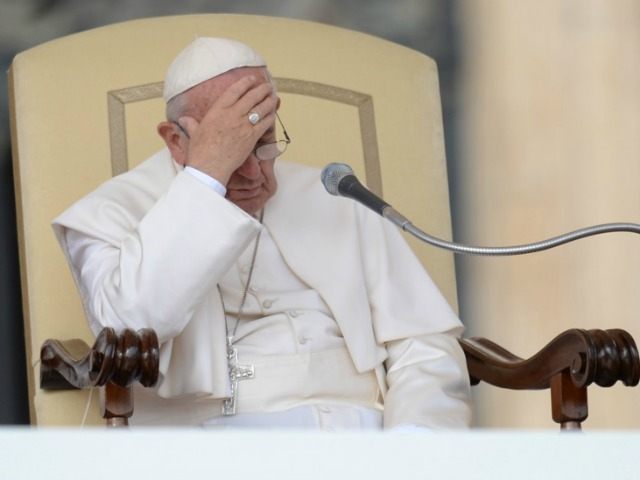“In the name of the Church, I would like to ask forgiveness for the scandals that have occurred in recent times, both in Rome and in the Vatican,” Pope Francis said at the beginning of Wednesday’s General Audience.
“I ask your forgiveness,” he repeated.
For these unscripted remarks, which were not in the official text, the Pope drew inspiration from the Gospel reading chosen for the day, in which Jesus speaks of the evil of giving scandal, especially to little ones. “Jesus’ words are strong today,” Francis said. “Woe to the world for its scandals. Jesus is realistic and says it is inevitable that scandals come. But woe to the one who gives scandal.”
Though the Pope went no further in explaining what he meant, his apology was enough to get rumor mills churning, with pundits attempting to fill in the blanks.
Some focused on the political situation in Rome, which is still recovering from the sudden resignation of its mayor, Ignazio Marino, just two months before the official opening of the Jubilee Year of Mercy. The Italian capital is expecting 33 million pilgrims and visitors to arrive during the holy year.
The Vatican newspaper, L’Osservatore Romano, published a scathing editorial after Marino’s resignation, noting that at less than two months before the Holy Year, “the capital has only one certainty: that of its own ruins.”
The newspaper lists some of the immense problems of the city, from “mafia infiltration” to a “dark veil over public administration and waste collection” to the lack of efficiency of “essential services, including public transportation” and road maintenance. “Rome really does not deserve this,” the article concludes.
Cardinal Agostino Vallini, the Pope’s vicar for the diocese of Rome, has also written a strongly worded open “Letter to the City,” in which he said that in the nation’s capital, “the matter of a new governing class can no longer be put off.” The letter will be read aloud in the Basilica of Saint John Lateran on November 5, in preparation for the beginning of the Jubilee Year.
In a separate speech, Vallini said that “today Rome is living through a period of real suffering, not just because of the affairs of the Capital City and corruption.” The fact is, he said, that “in this city there is a spiritual anemia. We live in a reality that has need of a shake-up.”
Regarding other scandals to which the Pope was referring, the Italian daily La Repubblica suggested it was “likely” that Francis had in mind the recent affair of a gay priest who worked in the Vatican, and who staged a very public “coming out” with his Catalonia boyfriend just before the Vatican synod on marriage and the family was set to begin. The priest issued a series of ten “demands,” including that the Catholic Church change its teaching on the morality of gay sex.
The priest, a Pole by the name of Kryzstof Charamsa, said he intended to make “an enormous noise” and to put “pressure” on the synod on behalf of the LGBT agenda. He accused the Church of hate speech, homophobia, hypocrisy, falsehood, persecution, marginalization, and rejection of gays.
The newspaper also referred to another story of homosexuality in the sanctuary of one of Rome’s most important parishes, St. Teresa of Avila, the headquarters of the General Curia of the Discalced Carmelites, as well as the case of the former Archbishop Józef Wesolowski, who was accused of pedophilia and child pornography and later died.
This last theory seems especially well-founded since during the address the Pope refers to scandals involving children.
Children come into the world trustful and defenseless, Francis said. And when this trust is betrayed, “children are injured by a ‘scandal,’ by an unbearable scandal, all the more serious, because they do not have the means to decipher it. They cannot understand what is happening,” he said.
Another newspaper suggested that perhaps Francis was also referring to the recent letter sent by a group of cardinals to the Pope, in which they lay out a series of “concerns” regarding how the Vatican synod on the family is being run.
This hypothesis seems less probable, given the fact that Francis has insisted from the beginning that all the bishops should feel free to speak their minds, even when they disagree with him.
Follow Thomas D. Williams on Twitter @tdwilliamsrome.

COMMENTS
Please let us know if you're having issues with commenting.